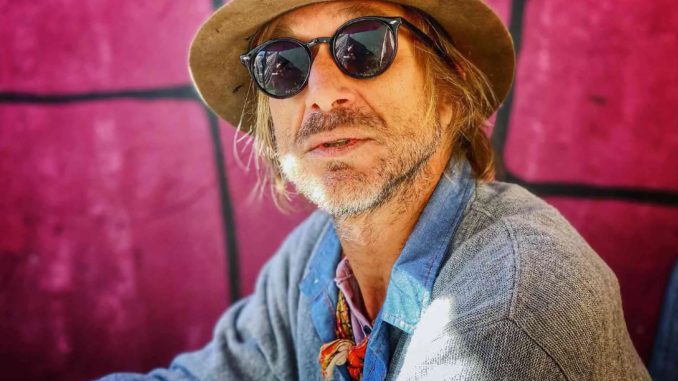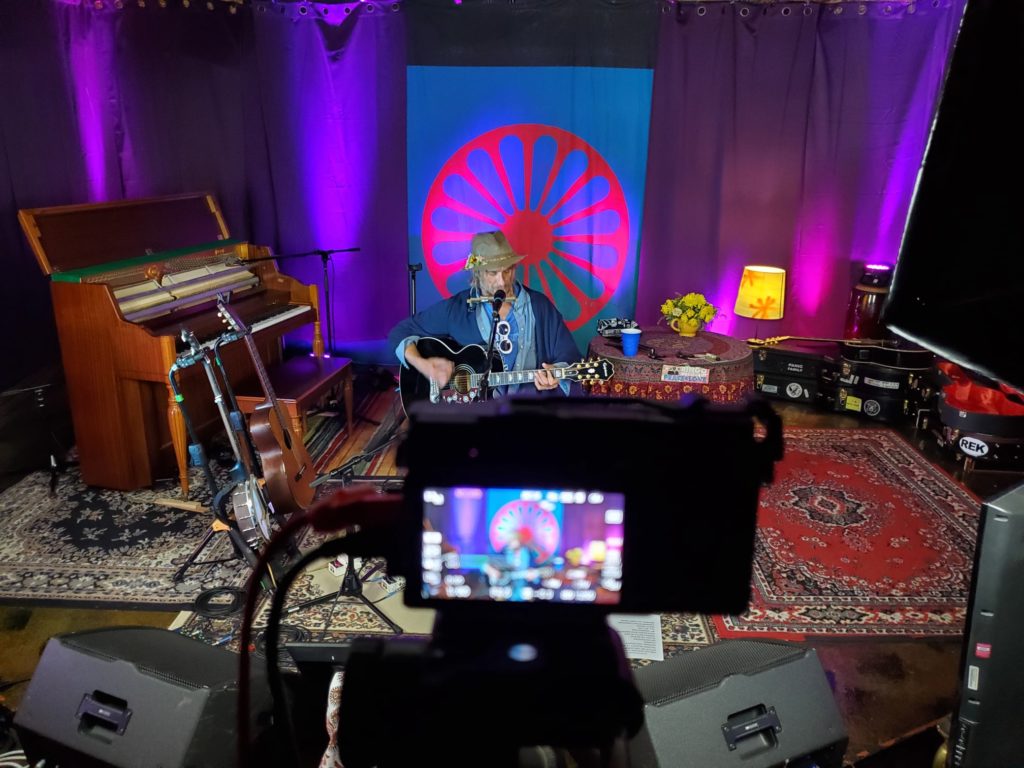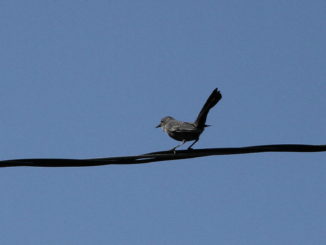
Before his current tour kicked off in June, Todd Snider hadn’t played live music in public since March 8, 2020. The 14 months that the coronovirus kept him off the road was the longest the Nashville-based singer/songwriter had been home in 30 years.
On stage and on the road is where Snider has lived the bulk of his life, and over the course of his three-decades-or-so career, it’s the live performances—filled with as much storytelling as folksinging—where he’s made his mark.
To keep the show going, he just moved it online for a weekly livestreamed gig under the banner of “What It Is.” Those Sunday performances broadcast from The Purple Building—Snider’s rehearsal/recording studio in East Nashville—inspired recording sessions for a concept album of sorts, First Agnostic Church of Hope and Wonder (released in April), featuring the songwriter playing the character of a preacher “who’s full of shit” trying to bring comfort (to others and himself) after a difficult year or so that also saw the death of several people close to the artist.
First Agnostic Church is Snider’s 19th solo release in a wide-ranging catalog that’s seen him try his hand at a variety of styles—country, rock, pop and even funk on this new one—but always with a folksinger’s heart and attention to lyrics at the center.
Over his career, Snider has been mentored by everyone from Jerry Jeff Walker and Jimmy Buffet to John Prine, and his approach has often combined the free-spirited rowdiness of the former two and the unpretentious lyricism and storytelling mastery of the latter. For his current “Return of the Storyteller” tour, Snider is bringing all of his troubadour powers to the stage, with career-spanning setlists and shows that are being recorded for a live album (“something special for those that missed live concerts as much as I have,” he says) to be released in 2022.
In advance of his Oct. 22 stop at the Paradise Performing Arts Center, the CN&R talked to Snider by phone about his new album, the friends he lost during the pandemic and getting back on the road.
How have things been for you out there in Tennessee?
It’s not bad. We had our Sunday shows to do, and I kind of quarantined with a group of about 10 people so we could do that show, and that was a lot of fun.
And then we made a record, and because we didn’t have any touring, it’s the first time I made a record almost just because I could. I didn’t have a big bunch of songs or anything like that. We had all the equipment, and I thought it would be fun. So, I made up the songs pretty quickly, which I don’t do. There’s a couple of them on there I’d like back, but it was part of the project.
It felt like a time to do some musical things that I’d always wanted to try to do, like play the bass or make a more funky thing. It gave me an opportunity to do something that would have taken a lot of money and time, and we had that time, and I didn’t need the money because I had my own studio. You know, troubadours don’t usually get a chance to work that hard on their records.
You mention troubadour and funky, it’s an interesting combination. The album sounds a little different than anything you’ve done before. It’s funky, but it’s still pretty intimate.
That’s really what I was hoping for. I didn’t want it to get so overwhelming that you’d forget that I was a folk singer. I’ve done so many different kinds of records. Usually, the fun thing is if you get inspired by something … if you get bit by a muse, you just run for it, you just take off after it.
You started the streaming shows from the earliest days of the pandemic, right?
Yeah, every Sunday at 11, I think it was. We have that building there, and we’ve just been collecting gear for a long time now. We realized we have great cameras, we have great lights, and we also had it set up to record.
I remember after one of those shows, I was like, “Why can’t I make a record here, right from this chair?” And we were like, “Yeah, we probably could, so let’s just start meeting down here every day.” I got my buddy Robbie Crowell—I just had one musician friend—and then three or four engineer friends, and then my gambling buddy, and that was it.

That’s a good group.
Yeah, right? It was really, really fun to do. You could easily find a better banjo player, or piano player, or bass player than me, but that was the fun of it for me.
Do you think you’ll go back to livestreaming?
I would like to, if we ever take another break. I’m pretty arthritic and it comes and goes. I thought there could come a day I where I would only be able to play with a certain amount of notice—like four or five hours notice. Like, “Hey, my hands are great today, I’m going to down and play for a few hours.” That’s kind of like my old Fred Sanford-years plan.
You wrote at least a couple songs on the new album about friends who died over the past year, right?
There was so much of that. It was a really dark year because we lost John Prine to the pandemic; that was the hardest thing. And then Jerry Jeff [Walker] and Billie Joe [Shaver]; they were older, and they all three had a good long run for troubadours.
We were all so down. Almost everyone of the people working on [the record] knew those guys. And then there were two suicides by guys my own age, and then also my dog [died]. All my friends knew my dog. He went everywhere. He sat on the stage; he never left me. So, I had all of that, and then my first manager, she died. She was my first manager, but she stayed in my life until the day she died.
So, all the songs on the new album were written during the pandemic?
Yeah. Usually, I’d [take] like three years or so to get 10 songs, and this time I just knocked them out—for better or worse.
All my singing career, I’ve tried to avoid telling people [things like], “Never let a day go by.” I thought, I’ve never really approached this as a preacher before. You know that song, “You’ve got to know when to hold them?” I’m like, No I don’t. I don’t have to know that. And anytime a singer tells me I just have to breathe, or anything like that—I can’t tell you how many times when I’m listening to the radio I always say, “No, I don’t. I don’t have to do that.” I don’t have to let myself dance and let go or any of that.
But this time I thought, Well, people are calling me a preacher now on Sundays, and I’ve got this Sunday show. It was almost an arc of what the big picture of what that show had been. I was kind of making up a story about a folk singer who had to stop traveling and do these Sunday shows that were pep talks.
Now that you’ve been out on the road, what’s it been like? How’s America reacting to the return?
People are really excited to see live music. It feels like they’re excited to be with each other, too. Sometimes they all have masks on. It feels like I’m about to get robbed by a mob.
You have a short speech you say at shows in which you say, “I didn’t come down here to change any of y’all’s mind about anything, I come down here to ease my own mind about everything.” Has being back on the road again helped ease your own mind after such a hard year or so?
Tremendously. More than singing, I like to travel. It’s become a really big part of my life. For people who are a gypsy or a traveler, we just don’t know how to sit somewhere. It drives us crazy. Once you get used to the water out there, it’s like kids—first they don’t want to get in the pool and then you can’t get them out.
KZFR presents Todd Snider Friday, Oct. 22, 6:30 p.m. Lilly Winwood opens.
Tickets: $25, available at eventbrite.com
Paradise Performing Arts Center, 777 Nunneley Road, 872-8454
kzfr.org


Be the first to comment